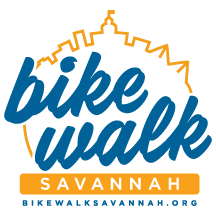So, when we start to talk about how to make things better for the average bicyclist in Savannah or anywhere, it is a pretty complex task using the personal auto-centric transportation grid currently in place. Experienced riders may go just about anywhere except restricted access interstate type highways, but less experienced cyclists will need some help.
In order to move a greater proportion of casual cyclists to take their bike out of the garage and start using it to get from A to B, we need to first educate on best practices in often unfriendly roadways. This involves both safe route selection and understanding how to ride safely.
The former is best accomplished by talking with people who are already riding around town regularly — i.e. networking with the bicycling community. SDRA has produced this map of the bike routes downtown, some local routes are already available at bikely.com, and recreational rides at mapmyride.com, but none of these is comprehensive. Therefore, so that longtime residents, visitors and newcomers will know about safer roads to travel, we at the SBC plan to develop a mapping system to rate specific roads’ suitability for cycling.
The second point of education, safe cycling, is not so complicated. We have previously referenced a video on the topic, but the bottom line is that as a cyclist, you are a vehicle operator with the same rights and obligations under the law as the much heavier and faster vehicles with whom we share the road.
 This means that with few exceptions, sidewalks should be avoided as your visibility is deceased and your chance of a car vs bike crash is much increased, not to mention the risk to pedestrians from bikes. It means that while traveling on wider roads, one should stay to the right and allow cars to pass. It means that on narrower lanes (even and especially where multiple lanes are travelling in the same direction) and there is not enough room for you and a car to share the lane, your safest choice is to take the lane. The potential for a sub-30 second inconvenience to a handful of motorists exists, but this action is supported by the law and could save your life.
This means that with few exceptions, sidewalks should be avoided as your visibility is deceased and your chance of a car vs bike crash is much increased, not to mention the risk to pedestrians from bikes. It means that while traveling on wider roads, one should stay to the right and allow cars to pass. It means that on narrower lanes (even and especially where multiple lanes are travelling in the same direction) and there is not enough room for you and a car to share the lane, your safest choice is to take the lane. The potential for a sub-30 second inconvenience to a handful of motorists exists, but this action is supported by the law and could save your life.
Finally, a helmet is important as your last line of defense against a car — you will be glad to have it when a careless motorist knocks you down. If you worry about helmet head or sweat, just think how unfashionable it would be to wear a hospital gown the rest of your life. There are some more fashion forward models out there now and ways around the sweat issue as well.
Stay tuned for part II of bicycling networks — how should we reinvent our infrastructure to make it accommodate cyclists better?



 This Friday June 20 is the third of the Dump the Pump days, this one corresponding with
This Friday June 20 is the third of the Dump the Pump days, this one corresponding with 
